Home Review
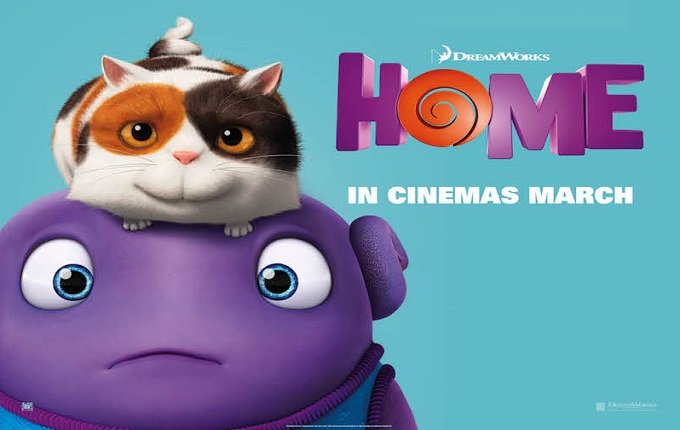
The Plot
When accident prone alien called Oh (Jim Parsons) sends an invite to his house warming party in his newly invaded home, he inadvertently brings the possibility of both his race (the Boov) and the planet’s previous owners’ total destruction. The planet in question: Earth!
The Good
With a voice cast that includes the star of The Big Bang Theory, two pop stars (Rihanna and Jennifer Lopez) and a comedy superstar (Steve Martin), Home seems to cater for just about every audience member. We even have the recognisable voice of Badger from Breaking Bad (Matt Jones) pop up throughout!
Add to that a beat popping soundtrack scattered with songs from two of the aforementioned cast members that will make you ‘put your hands in the air like you just do not care’ as Oh so eloquently puts it, and Home has everything checked off the animation blockbuster list.
The story is simple and sweet, sending the message that it’s ok to be different while accompanied by some beautifully colorful animation. Oh and his new human friend Gratuity (Rihanna) nicknamed Tip, go on a quest to find Tip’s mother and save the world. It’s a fun ride with jokes aplenty along the way. Highlight’s include Oh’s inspired use of a cookbook to literally cook dinner and his childlike limited vocabulary. His inability to form proper sentences should grate on our patience, but when it comes out of Jim Parsons’ mouth it’s just undeniably endearing. In truth most of the films highlights come from the cute and colorful Oh.
On a side note. If Tip’s delightfully lazy cat Pig looks oddly familiar it’s probably because it bears more than a passing resemblance to the cartoon feline featured in Big Hero Six. Proof at least that Garfield hasn’t entirely ruined the careers of all animated cats.
The Bad
While Home is fun and colorful with a lovely message behind it, it does look like Dreamworks are slipping in quality ever so slightly. They can do wonders with films like How To Train Your Dragon 2 but ultimately their smaller films (Which Home arguably is when compared to HTTYD franchise) aren’t quite as technically accomplished as their daunting competitions from Disney and Pixar
The Ugly Truth
With great animation, voice actors, music and messages, Home ticks all the boxes. There’s no denying it’s charm, but the emotion is perhaps slightly missing.
Insurgent Review
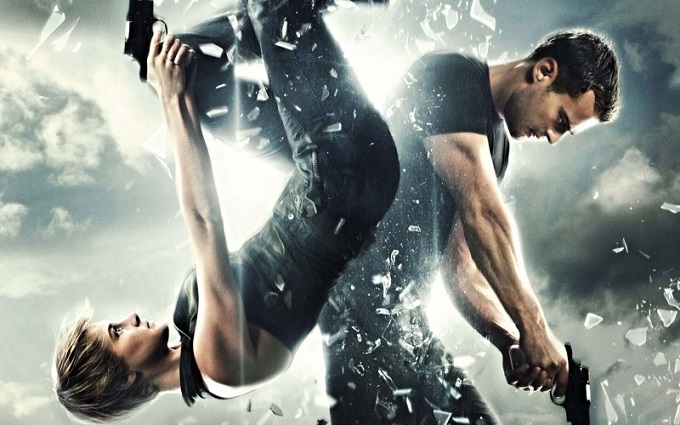
The Plot:
In a post-apocalyptic society strictly divided into casts by personality types, Tris Prior and her fellow ‘Divergent’ renegades that defy classification, must find a way to fight back against the sinister forces determined to take control of what’s left of human civilization. As Tris battles her inner demons, the shifting loyalties of her friends, family and even enemies test her like never before.
The Good:
Picking up mere days after the events of the first film, Insurgent promises fans answers to some of the questions and emotional issues left unresolved during the frantic climax of Divergent. The film makes the most of a clearly improved budget to explore the ruined remains of Chicago and the even more fantastical world of the virtual reality tests Tris must overcome.
Theo James is still appropriately rugged as Tris’s handsome love interest Four and Shailene Woodley remains a welcome alternative to the typical damsel in distress cliché that so often ruins action blockbusters. The mere presence of talents like Miles Teller, Ansel Elgort and Kate Winslet also immediately improve the attention span of audiences. It gives at least the impression of substance behind even admittedly threadbare and predictable material.
Those that found the deadly virtual reality games that tested Tris in the first film interesting, will be pleased to see that concept taken to even more elaborate places. It gives the film an excuse to escape an otherwise generic and dreary dystopia and at least insert some CGI heavy fantasy action sequences.
The Bad:
Fans of the book series and first film will welcome the continuation of the Divergent saga, but for the uninitiated this will prove a confusing and disappointing experience. Though the film makes a cursory effort to explain the situation with a quick opening monologue, in truth if you haven’t seen the first film you’ll be left entirely lost.
Sadly like all the other recent ‘young adult’ franchises the Divergent series struggles to maintain the relative promise of its first big screen outing. The first film offered a moderately intriguing tale of a dystopian future and misguided social engineering. The sequel continues that adventure with an obviously bigger budget, a lot more angst but far less novelty.
Shailene Woodley is a talented young actress but her character is simply far too preoccupied with self-doubt and recriminations. It’s so unnecessary and unhelpful it often threatens to make Tris more irritating than inspiring. In one scene our hero literally ‘squeaks’ with discomfort whilst confessing her feelings of guilt over past deeds. Perhaps all the tears, self-loathing and melodrama will be less distracting and annoying for a target audience of teenagers, but grown-ups may find it far harder to empathise.
Though Insurgent boasts a cast that includes Miles Teller, Ansel Elgot and Kate Winselt the sad truth is that none of them ever have the slightest chance to demonstrate their undoubted talents. Somehow Insurgent manages to make every character feel like they’re being given insufficient screen time and lacks emotional depth or complexity. Even when characters make supposedly dramatic decisions or betrayals, it feels irrelevant because there’s so little emotional investment in proceedings.
Only fans of the actual books will be able to tell whether something has been lost in translation to screen, or if characters motives really were always so poorly defined and explored in the original story.
Though the film spends a big chunk of time and its bloated budget putting Tris back into elaborate virtual realities, it’s just a transparent excuse for expensive superhero style action sequences. Again it’s impossible to really care about what happens as both the characters and audiences are fully aware that it’s never real. It doesn’t matter if people die or entire cities crumble, because nothing is actually happening.
Overall Insurgent’s biggest failing is that despite all its troubled nightmares, dramatic haircuts and angst ridden dialogue its almost entirely lacking in actual emotional substance. It simply lumbers through predictable story arcs merely out of an unfortunate obligation to perpetuate a valuable ‘franchise’.
The Ugly Truth:
Unless you’re already a devoted fan of the Divergent series, it’s probably best to avoid getting involved at this stage. Insurgent is a typical blockbuster sequel that feels mostly superfluous and redundant. Occasional bursts of CGI action and the mere presence of a talented cast can’t disguise that fact that the entire film feels at best like a set up for a hopefully more interesting third chapter.
Our chat with Ansel Elgot about the Divergent Sequel and Shailene Woodley below:
Run All Night Review
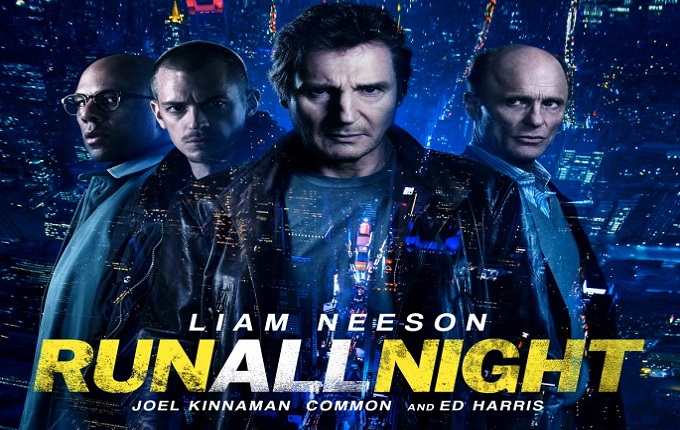
The Plot:
Mobster and hit man Jimmy Conlon has one night to figure out where his loyalties lie: with his estranged son, Mike, whose life is in danger, or his longtime best friend, mob boss Shawn Maguire, who wants Mike to pay for the death of his own son.
The Good:
Since the astonishing and unexpected success of Taken, Liam Neeson has successfully transformed himself from a respected dramatic actor to one of the world most popular and bankable action stars. His towering physique and world weary yet likably gruff voice makes the 62 year old actor an implausibly credible killing machine.
Neeson’s innate charisma is almost all the film needs to carry off a fairly straightforward tale of underworld misdeeds and retribution. He even has enough on screen presence to spare that he can carry Joel Kinnaman as his son/obligatory sidekick.
The film is at its best and most watchable whenever Neeson is angry and busy efficiently dispatching bad guys for our viewing pleasure. Luckily the film doesn’t dwell on its family melodramas for too long without at least punctuating things with regular gunfire and action.
Though the film follows a simple and familiar action formula, it remains watchable and maintains a somewhat urgent momentum throughout.
The Bad:
Taken. Taken 2. The Grey. Unknown. Non-Stop. A Walk Among The Tombstones. Taken 3. This is a list of the number of times you’ve watched Liam Neeson ruthlessly kill bad guys in a vaguely justified manner in recent years. Now add Run All Night to that list of mostly diminishing returns. The novelty of watching Neeson reluctantly dispatching bad guys while dispensing gravel voiced action clichés is perhaps starting to wear just a little thin.
Once again Neeson plays a character haunted by past deeds, reluctantly pulled into a violent game of cat and mouse, which inevitably reveals his surprisingly violent skill set. However this time, instead of his usual backstory as a retired cop or government agent, Neeson is playing a former gangster hitman. His bitter self-loathing is a little less fun to watch and makes it slightly harder to see him as a typically heroic figure.
Neeson’s past action exploits have unfortunately become so familiar they’re now decidedly predictable. Run All night once again runs through his well-established formula. Sadly this includes genre clichés such as unlikely coincidences and an unnecessary sidekick. Much like Taken 2, Run All Night makes the mistake of teaming Neeson’s efficient one man army with his own actively unhelpful offspring.
As Conlan’s son Kinnaman contributes little to the film other than belligerently reminding Neeson and audiences that the unapologetic hitman was also a lousy father. Though his son is central to the plot device that pits Neeson’s hitman against his best friend and former mob boss, the screen time devoted to their broken relationship is always less entertaining than watching Neeson at work.
Ed Harris still has stage presence as gangster Shawn McGuire, but sadly he’s a little too old and two dimensional to make a truly menacing villain. Likewise Common plays a rival assassin who’s simply too consistently inept to feel like a real theat.
Overall Run All Night lacks the sense of fun that made Taken a fan favourite and satisfying guilty pleasure. Though it offers audiences plenty of cathartic guilt it takes itself a little too seriously at times. It also attempts to hide a very simple plot behind elaborate flourishes of fancy CGI aided camera moves. An obvious trick that’s never in any danger of succeeding.
The Ugly Truth:
Fans of the fast growing genre of ‘Liam Neeson kills things with guns and his bare hands’ will no doubt be pleased to welcome yet another title into their growing collection. Unfortunately others may begin to share Neeson’s trademark weariness. Run All Night is watchable and delivers some satisfying moments, but exclusively with thanks to Neeson’s action skills.
Unfinished Business Review
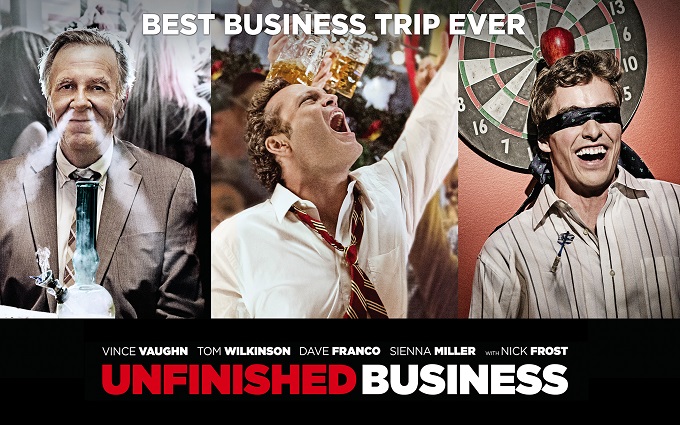
The Plot
After being fired from his job Dan Trunkman (Vince Vaughn) teams up with two businessmen, one recently retired (Tom Wilkinson) the other, a young inexperienced man in every sense of the word (Dave Franco). But the trio’s first big deal is put in jeopardy when Dan’s old boss (Sienna Miller) turns up to steal his wealthy client.
The Good
Vince Vaughn still has at least some appeal for fans who prefer their comedy tall and nervously sarcastic. Likewise Dave Franco’s cult following & viral video fans will perhaps be more inclined to enjoy watching him fully indulge his inner moron. The film might also help those looking to entirely disengage their brain for 90 minutes as it never demands any thought from audiences either.
Sadly there’s not much to save Unfinished Business from the mess it ends up being, but the faint glimmers of silver lining behind the thunderous clouds come mainly thanks to Tom Wilkinson.He doesn’t come close to rescuing the film, but he’s more successful at amusing audiences than his overly eager co-stars. Wilkinson’s character at least has the most potential, playing a businessman fighting against reluctant retirement while suffering the woes of a loveless marriage. The mere presence of an actor of his caliber elevates proceedings, even if you suspect he’s only on board to add to his actual retirement fund in lieu of a second visit to the Best Exotic Marigold Hotel.
The Bad
Unfortunately for Wilkinson, his character and subsequent storyline is largely pushed aside to make way for the headline act of the consistently disappointing Vince Vaughn. We can only hope Unfinished Business proves to be the last time Vaughn tries to squeeze laughs out of characters failing at their jobs. Vaughn’s affable blend of borderline obnoxious charms and underachievement may have worked in hits like Swingers or Dodgeball, but it’s also seen him relegated to a series of unimpressive comedy flops. Sadly this time cinemas are likely to yet again echo with deafening silences as the majority of the jokes fall flat.
Finishing off this terrible trio is Dave Franco, an actor who, like Vaughn, has indeed got good comedies in his back catalogue and knows how to make us laugh (21 Jump Street comes instantly to mind). Unfortunately Franco is brought down by a character so inherently dumb that he comes extremely close to doing precisely what Robert Downey Jr warns against in Tropic Thunder. When a comedy character’s biggest and arguably only comedic moment is the fact that his surname resembles that of a breakfast meal, you know you’ve got problems!
Even the attempt at giving the film a heart and soul with the inclusion of Vaughn’s children who are both dealing with bullying at school, albeit in completely opposite ways, does more harm than good. It simply gives us more reason to hate Vaughn’s character as he constantly feigns a frozen connection on his iPhone. Add shameless product placement to the growing list of movie sins.
We haven’t even mentioned the actresses in the film, but there is a very simple explanation for this. They are another thing recklessly discarded in favour of more underwhelming screen time for the film’s misfiring leads.
The Ugly Truth
Unfinished Business is a messy disappointment which sacrifices far too much real potential to make way for Vince Vaughan and Dave Franco in showboating performances that miss the mark badly. So badly in fact that it’s actually a relief when the business is finally finished. We can only hope Vince Vaughn manages to dramaticaly redeem himself in the second series of the superb True Detective.
Chappie Review
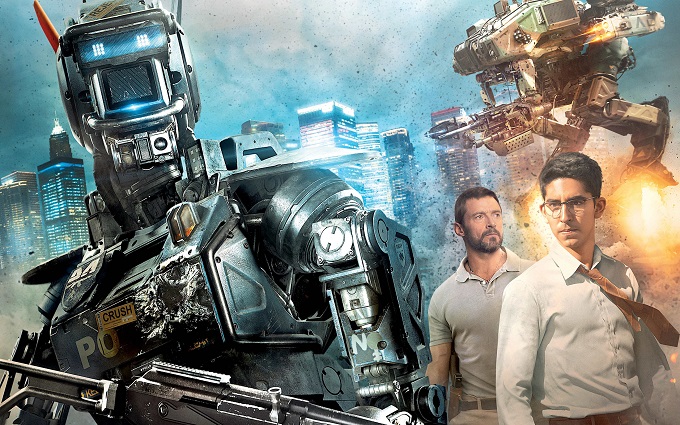
The Plot
In the near future, police droids are patrolling the streets of South Africa, bringing the crime rate down drastically. But when their creator (Dev Patel) steals a decommissioned droid and programmes it to think and feel for itself, trouble begins…
The Good
While Chappie is certainly not quite welcome up to the high standards of Blomkamp’s brilliant debut District 9, it’s certainly a step up from his rather disappointing follow-up, Elysium. Chappie shows that he still has what it takes to explore interesting themes in challenging new sci-fi. As the third piece of an unofficial trilogy of stylish dark science fiction, it’s also proof that the Alien franchise is now definitely back in safe hands with Blomkamp’s planned sequel.
Chappie opens with the same documentary style showcased in District 9, before swiftly moving onto the main action and exploring some great ideas. Though it occasionally loses its footing, the film stumbles along proudly.
Blomkamp’s past success and distinctive style has helped him assemble a talented cast of familiar faces. Dev Patel delivers a great performance as the kind hearted robot inventor determined to educate and protect Chappie, keeping his existence secret from his more sinister colleagues. Hugh Jackman has fun playing against type as a mullet sporting bad guy and sci-fi legend Sigourney Weaver is a welcome addition as his ruthless boss.
It’s an undoubtedly strong supporting cast, but praise must go first and foremost to Sharlto Copley in the titular role. As the voice of heroic robot Chappie, Copley breathes so much life into the character that audiences completely forget they’re watching a carefully crafted CGI creation. It’s a compelling combination of performance and visual effects which equals the widely celebrated achievements of Andy Serkis in the recent Planet of the Apes franchise.
As Chappie comes to life, so does the film. Chappie starts out with an endearingly infantile and navie personality. Slowly learning about the world and himself, just like a human child would. A task made more complex by the dramatic contrast between his creator and his adoptive gangster parents played by members of real life South African rap group Die Antwodd.
The juxtaposition and conflict between these three characters injects some interesting and thought provoking themes into the film amongst its actions sequences. It helps Chappie almost reach the impressively high standards set by Blomkamp’s auspicious debut Dirstrict 9.
The Bad
As mentioned before, Chappie does come a little loose in terms of its style and the message it wants to bring to audiences.
In one corner we have a genuinely interesting plot which raises questions about artificial intelligence that, although not particularly groundbreaking, are still exciting to explore in this near future world of robocop type police droids. In the other, we have a genuinely exciting action movie with some great set pieces and Hugh Jackman playing a villainous cliché who spends most of his time talking to himself in an almost pantomime way.
The film struggles to reconcile these different elements and combine them into a cohesive story. It’s hard to find a middle ground between the film’s somewhat schizophrenic intention to be a both a scientific think piece and a crowd-pleasing action blockbuster. The film’s contradicting ambitions risks leaving it a confused mess.
An even bigger risk is the film’s occasionally lazy plot holes that are a little too silly to be comfortably ignored. You’d expect evil high-tech weapons manufacturers to have a state of the art security system. Yet somehow Dev Patel manages to walk expensive and dangerous materials for his homemade artificial intelligence out the back door without anyone noticing until the third act.
The Ugly Truth
Chappie is an accomplished third effort from one of the most distinctive and innovative directors in the sci-fi genre. It’s mostly a return to the impressive form of Distrcit 9 after the relative disappointment of Elysium. While the film occasionally gets confused as to where it should be tonally, Chappie is still a good bit of fun that’s worth your time. Bring on Blomkamp’s Alien sequel.